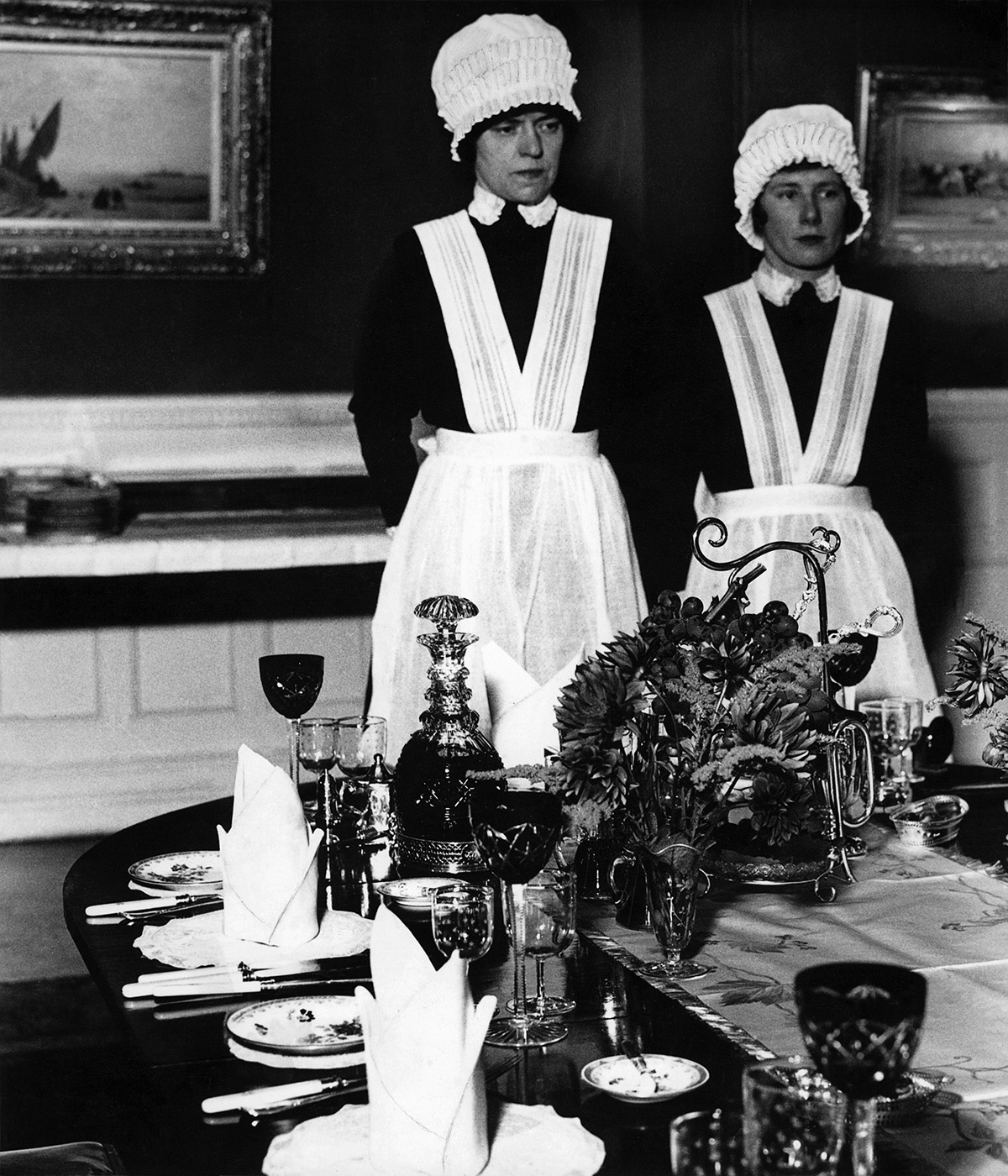In Pictures: Culture, class and identity through the decades
- Text by Max Gayler
- Photography by Cover image by Peter Dench

From the mistreatment of steel workers leading to the 1926 general strike, to the eviction of council families and unresting gentrification of today’s London, the British class struggle has always been a prevalent issue. Capturing the true extent of this is difficult, but a pool of photographers, brought together for Beetles + Huxley’s new exhibition, ‘An Ideal for Living’, have tried.

Red Hijab, Red Dress and Bling, from the series ‘Honest with you’, 2013 © Mahtab Hussain

New Brighton. From ‘The Last Resort’. 1983-85 copyright Martin Parr / Magnum Photos
Exhibiting the work of a talented collection of photographers, the exhibition shows the variety and creativity with which photographers have sought to document what they consider to be a particularly British way of life. The exhibition includes Cartier-Bresson’s candid black and white images of inter-war central London, and Simon Roberts’ and James Morris’ examination of rural landscapes in modern Britain.
The project examines the ever-changing face of identity struggle across Britain. While Frank Habicht sought to depict fashions and trends during the 1960s, Charlie Phillips was documenting black communities in the city, returning time and time again to Notting Hill Carnival.

Notting Hill couple, 1967 © Charlie Phillips

May Ball, Cambridge, 1983 © Jurgen Schadeberg
Phillips claims his inspiration for this came from “ the era of cold war and American GI’s who visited the area, at the time the average family was living in one room.”
“Then I saw an illustration by Norman Rockwell, of American Life, in the Saturday Evening Post”, Phillips continues, “and I thought why not apply it to my neighbours and document our Caribbean life. It was my intention to put them into an album to take with us when I returned to live in Jamaica, which I never did.”

Mill Girls, Elland, Yorkshire, 1965 © John Bulmer

School boy with luggage, Paddington Station, London, 1933, © Emil Otto Hoppe
Charlie agreed to be part of this exhibition as he felt his photographs show a side to London’s civil history that is rarely celebrated in pictures. “Emil Otto Hoppés School Boy with Luggage, Paddington Station, London, 1933, It reminded me of my own childhood. I was twelve when we came to Britain and the memory of arriving at Paddington Station on the boat train.”
![[Photo by James Morris]](https://www.tcocdn.com/wp-content/uploads/2016/07/James-Morris.jpg)
Blaenau Ffestiniog, Gwynedd Wales, 2008 © James Morris

No loss of face, Earl’s Court, London c 1960 © Frank Habicht
The issue of race is further explored by Syd Shelton, whose photographs of the Battle of Lewisham in 1977 exhibit how punk influenced a generation to abolish racism and instead focus on a more inclusive future for London’s music scene.

Bagga (Bevin Fagan) Hackney, East London, 1979 © Syd Shelton
Showcasing other less visible cultures from around the UK, photographs from Chris Killip show the idiosyncratic appeal of rural life in England. He documents a community in Lynemouth that survived by collecting coal from the sea.

Tuinol Barry, Kings Road, London, 1983 © Derek Ridgers

Parloumaid and under-parlourmaid ready to serve dinner, 1936 © Bill Brandt
Exploring Britain’s social identity is a subject widely studied but rarely pulled off in a way as convincing as in these photographs. From the windowless houses of miners from the 1930s to the densely populated parks of London’s chaotic summer, this collection offers a chronological look at how the dynamic of Britain’s class culture has responded to a government constantly trying to hold onto their power.
All images courtesy of Beetles + Huxley.
‘An Ideal for Living’, is open from 27 July – 17 September 2016.
Enjoyed this article? Like Huck on Facebook or follow us on Twitter.
Latest on Huck

In the ’60s and ’70s, Greenwich Village was the musical heart of New York
Talkin’ Greenwich Village — Author David Browne’s new book takes readers into the neighbourhood’s creative heyday, where a generation of artists and poets including Bob Dylan, Billie Holliday and Dave Van Ronk cut their teeth.
Written by: Cyna Mirzai

How Labour Activism changed the landscape of post-war USA
American Job — A new exhibition revisits over 70 years of working class solidarity and struggle, its radical legacy, and the central role of photography throughout.
Written by: Miss Rosen

Analogue Appreciation: Emma-Jean Thackray
Weirdo — In an ever more digital, online world, we ask our favourite artists about their most cherished pieces of physical culture. Today, multi-instrumentalist and Brownswood affiliate Emma-Jean Thackray.
Written by: Emma-Jean Thackray

Meet the shop cats of Hong Kong’s Sheung Wan district
Feline good — Traditionally adopted to keep away rats from expensive produce, the feline guardians have become part of the central neighbourhood’s fabric. Erica’s online series captures the local celebrities.
Written by: Isaac Muk

How trans rights activism and sex workers’ solidarity emerged in the ’70s and ’80s
Shoulder to Shoulder — In this extract from writer Jake Hall’s new book, which deep dives into the history of queer activism and coalition, they explore how anti-TERF and anti-SWERF campaigning developed from the same cloth.
Written by: Jake Hall

A behind the scenes look at the atomic wedgie community
Stretched out — Benjamin Fredrickson’s new project and photobook ‘Wedgies’ queers a time-old bullying act by exploring its erotic, extreme potential.
Written by: Isaac Muk